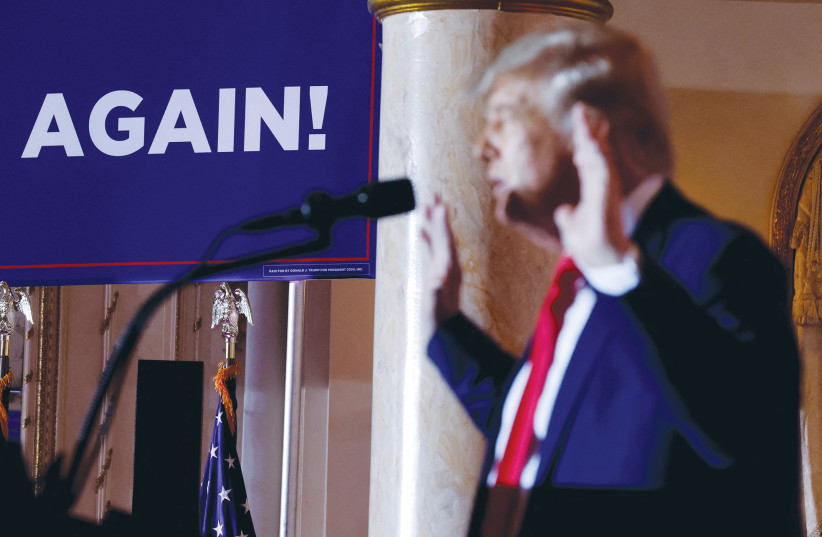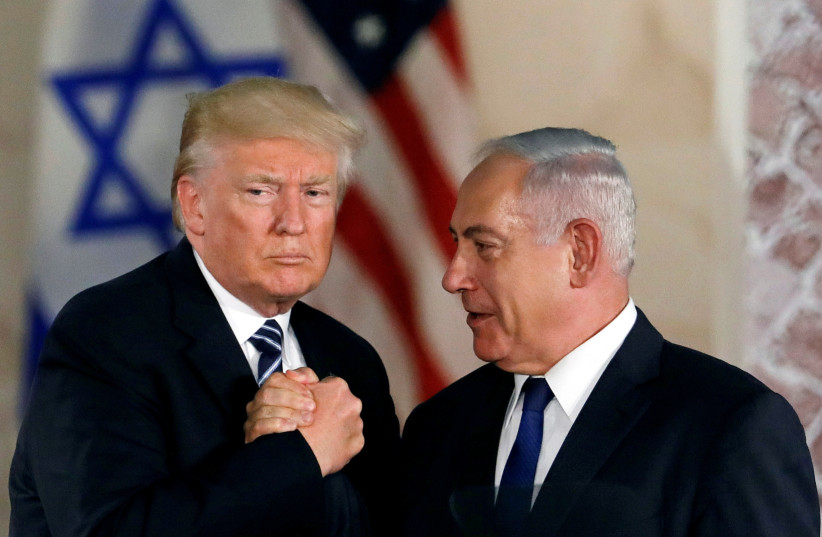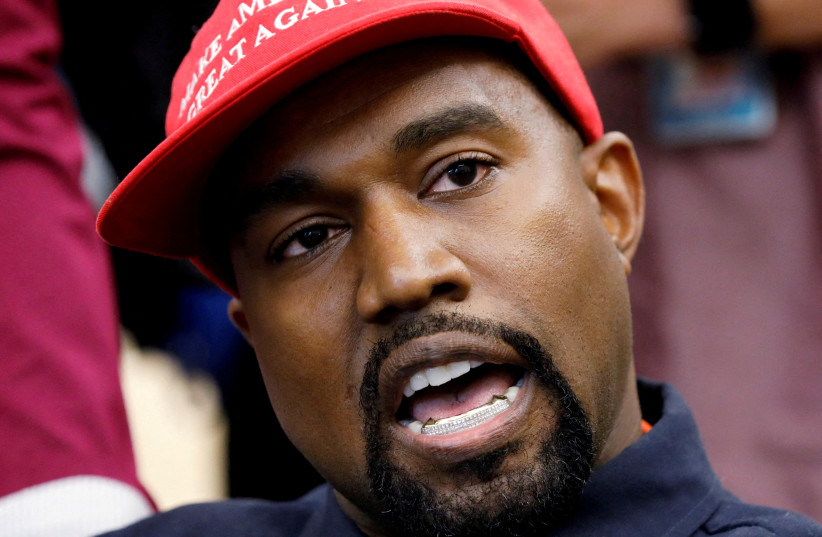During the height of the 2016 US presidential campaign that pitted Donald Trump against Hillary Clinton, Salena Zito wrote an insightful piece about candidate Trump in The Atlantic.
“The press takes him literally, but not seriously,” she wrote. “His supporters take him seriously, but not literally.”
This was as true during Trump’s four-year presidency, as it was during his campaign. While Trump’s detractors would take all of his comments quite literally, even his outlandish ones, his supporters generally laughed them off, claiming he was exaggerating for effect, or that he didn’t literally mean what he said.
Jewish supporters of Trump fell into the same pattern.
"The press takes him [Trump] literally, but not seriously. His supporters take him seriously, but not literally."
Salena Zito
When during the 2016 campaign he leaned into the stereotype of Jews and money – telling a Republican Jewish Coalition meeting, “I’m a negotiator like you, folks; we’re negotiators” – those Jews who detested Trump saw in his words antisemitic tropes, while Jews who supported him said he meant nothing bad by this and was just expressing respect for Jewish financial acumen.

Same after the white supremacist rally in Charlottesville in 2017, when he said, “You also had people that were very fine people, on both sides.” His critics panned him for saying there were fine neo-Nazis, while his Jewish supporters said his words were taken out of context, that he obviously doesn’t think there are good neo-Nazis. How could he, since his daughter, son-in-law and grandchildren are Jewish?
The same dynamic was in play when he began questioning Jewish loyalty. In 2019 he said, “Any Jewish people that vote for a Democrat, I think it shows either a total lack of knowledge or great disloyalty.” His critics said that he was blowing antisemitic dog whistles – hinting at Jewish dual loyalty – while his supporters said he was just venting frustration that more Jews didn’t vote for him despite what he did for Israel and that his words should not be taken literally.
Following his infamous dinner at Mar-a-Lago last month with Kanye “I like Hitler” West and Nick “What Holocaust?” Fuentes, no less a Jewish Trump supporter than former US ambassador and close Trump ally David Friedman, took the former president to task.
“To my friend Donald Trump, you are better than this,” Friedman tweeted. “Even a social visit from an antisemite like Kanye West and human scum like Nick Fuentes is unacceptable. I urge you to throw the bums out, disavow them and relegate them to the dustbin of history where they belong.
“I condemned Barack Obama associating with Louis Farrakhan and Jeremiah Wright,” Friedman continued. “This is no different. Antisemites deserve no quarter among American leaders, Right or Left.”
What did Trump say most recently?
And that was last month, before Trump’s newest social media post about Jews.
On Friday, in response to sharp criticism of his dinner with West and Fuentes, Trump wrote on his social media platform Truth Social: “Jewish leaders forgot that I was the best, by far, President for Israel. They should be ashamed of themselves. This lack of loyalty to their greatest friends and allies is why large numbers in Congress, and so many others, have stopped giving support to Israel.”

“Jewish leaders forgot that I was the best, by far, President for Israel. They should be ashamed of themselves. This lack of loyalty to their greatest friends and allies is why large numbers in Congress, and so many others, have stopped giving support to Israel.”
Donald Trump
In Trump’s reasoning, because he moved the US Embassy to Jerusalem and recognized Israeli sovereignty over the Golan, Jews owe him total fealty – as if he were a medieval overlord – even as he elevates the worst types of antisemites and perpetuates the idea that Jews, or in this case Jewish leaders, are incredibly disloyal.
As he repeats these types of calumnies with greater frequency, even Jews who appreciate the good he did for Israel while in office are less likely to overlook these types of comments.
If, when Trump was president, an argument was put forward that the good he did for Israel outweighed the back-wind his words provided antisemites, now that idea is no longer relevant. Trump’s elevation of antisemitism and the stereotypes of Jews that he trades in at a particularly fraught moment for Jews in the US is not outweighed by anything positive he is doing for Israel.
Prime Minister-designate Benjamin Netanyahu, when he was prime minister, repeatedly said that Trump was the best friend Israel had in the White House since Harry Truman. As a sign of appreciation, he even announced that he was naming a new community in the Golan Heights after Trump.
Last week, Netanyahu was essentially asked by Chuck Dodd on Meet the Press about Trump and West, and whether support for Israel cancels out everything else.
Asked why Trump can’t denounce West, Netanyahu said he did not know, and then ticked off the “great things” the former president did for Israel, including recognizing Jerusalem as Israel’s capital and moving the embassy, recognizing Israel’s sovereignty over the Golan Heights, and withdrawing from the Iran nuclear agreement.

“And I remain appreciative,” Netanyahu said. “On this matter, on Kanye West and that other unacceptable guest [Fuentes], I think it’s not merely unacceptable. It’s just wrong. And I hope he sees his way to staying out of it and condemning it.”
But not only did Trump not stay out of it or condemn West or apologize for that dinner, but he also condemned Jewish leaders for their condemnations of that event.
Todd said that Netanyahu’s praise sounded like an “ends-justified-the-means argument,” and asked Netanyahu at what point does Trump’s behavior that inspires violence against Jews “wipe away anything good he did for Israel?”
“I don’t overlook antisemitism. I have a clear position against it, which I voice and I expect others to voice as well,” Netanyahu said. “The issue of balancing interests with values, that’s really what you’re asking. Where do you draw the line? Well... in real political life, in real political leadership, leaders of democratic countries constantly make that balance. The president of the United States... meets sometimes with leaders of democracies and often with leaders of dictatorships which he finds unsavory because he’s balancing America’s interests. Everybody does that.
“But for me, the dividing line is very clear. When it comes to questions of our existence, safeguarding our existence, then existence comes first... I’ll mention the fact that Churchill, whom I admire greatly, made a pact with Stalin. You know who Stalin was. You know how many millions he murdered. But he said, ‘Well, to deal with the larger danger of Hitlerism,’ he made a pact with Stalin. That’s where I would draw the line. I hope we never get to it. We haven’t so far, and I don’t intend to.”
With Netanyahu soon set to return to the office, and with Trump refusing to denounce West as he did on Friday, slamming segments of American Jewry, Netanyahu will continue to be asked – and at some point be expected to answer – the following question: When have the benefits Trump provided Israel been outweighed by the harm he is causing to America’s Jews?
